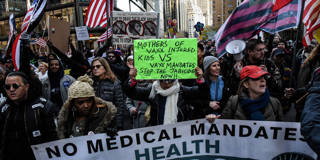Maintaining trust in science requires sound communication. Scientists and their public advocates must be more open about the uncertainties inherent to their enterprise, and more willing to draw clear distinctions between what is and is not considered settled knowledge.
NEW YORK – In recent years, and especially during the COVID-19 pandemic, attacks on science and scientists have been escalating to an alarming degree. Health officials and the broader scientific community have pleaded with policymakers and the public to “follow the science.” Yet such slogans fall flat with those who have little regard for scientific authority, not least because science proponents have been using the same blanket term as those who attack it.

NEW YORK – In recent years, and especially during the COVID-19 pandemic, attacks on science and scientists have been escalating to an alarming degree. Health officials and the broader scientific community have pleaded with policymakers and the public to “follow the science.” Yet such slogans fall flat with those who have little regard for scientific authority, not least because science proponents have been using the same blanket term as those who attack it.